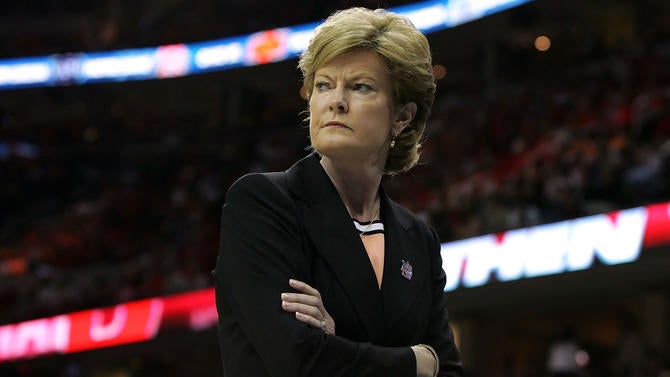It was August 2008 -- just four months after the person mostly responsible for making women's basketball what it is today had won her eighth national championship -- when I sat poolside and drank beers with Pat Summitt on a Friday night as the sun was setting in the Los Angeles sky.
How cool is that?
We'd both been asked to speak earlier in the day at the Double Pump Collegiate Business Conference -- her on being an iconic figure in basketball, me as a much less-important member of a media panel. When we were done, there was a cocktail reception by the pool at the Hilton Los Angeles/Universal City. And somehow -- I honestly don't even remember how; I just remember thinking it was neat -- I ended up at a table with Pat Summitt, who had, at the time, won more college basketball national championships than anybody not named John Wooden, and who was, at the time, well on her way to winning a Division I record 1,098 games.
We talked about Tennessee a little because we were both born in the state. And we talked about that wild No. 1. vs. No. 2 matchup between the men's teams at Memphis and Tennessee from the previous February. And we talked about the time I had, as a student reporter during my junior year of college, watched her Lady Vols -- who were in the process of going 39-0 and winning the 1998 national championship -- beat Memphis 91-65 in the tiny Elma Roane Fieldhouse. And I don't really recall what else we talked about, long as I'm being honest. I just remember we talked for a good while. And that she was cool. And thoughtful. And sharp. And inquisitive. And engaging. And just ... I don't know ... normal.
That was my biggest takeaway from the evening, that I was hanging with a woman who was literally the best to ever do what she did for a living -- How often are any of us in the presence of someone who is the best to ever do what they do? -- and that she didn't carry herself that way at all. She sipped cold beers, asked me as many questions as I asked her, made jokes, laughed a lot and was generally just ... normal.
Three years later she was diagnosed with early onset dementia, Alzheimer's type.
Four years after that, she was moved to a retirement center.
Now she's dead -- at the age of 64.
And it really is just heartbreaking.

I do not tell the above story to suggest I was tight, at any time, with Pat Summitt. I want to be clear about that. Because I was not tight with Pat Summitt. I was around her just a few times ever. She had lots of friends. I was not one of them. But I still wanted to tell that story because, when you hear her friends in the coming days explain how cool and normal she was despite all the fame and success, I want you to know they're not just saying it because they're her friends. I want you to know they're saying it because it's true.
I wasn't anybody to Pat Summitt. She didn't need me in any way. But she was still so cool and normal in my presence, and my understanding is that she was that way because, well, because she was just that way. And that's among the reasons I hated hearing, in August 2011, that she'd been diagnosed with Alzheimer's. Because I knew better than most that she wouldn't stay that way much longer.
My grandmother had Alzheimer's.
She was diagnosed several years before Summitt. She also died this year. In between, I saw her go from a smart and focused woman who watched me while my parents worked during the summers of my youth to a helpless soul who didn't even know my name. She went from sweet to irrationally irritable. She was forever confused. She had moments where she thought she was still a kid and would ask me to "take her home" because she was scared that if she wasn't home before sunset she would "get a whoopin'." As embarrassed as I am to admit it, it got to the point where I hated seeing my own grandmother because I didn't recognize her any more than she recognized me. The conversations were too painful.
You don't beat Alzheimer's, you see.
You can fight and beat cancer. People do it everyday. But you do not beat Alzheimer's. It always gets you. If you're lucky, it gets you slowly. But it always gets you. And it got Summitt too damn fast.
Dead at 64?
That's five years younger than Duke's Mike Krzyzewski. Seven years younger than Syracuse's Jim Boeheim. One year younger than North Carolina's Roy Williams. Eleven years younger than SMU's Larry Brown. And Summitt was just one year older than Louisville's Rick Pitino and three years older than Michigan State's Tom Izzo.
Those fellow Naismith Hall of Famers are all still operating at a high level.
Summitt should be, too.
She coached her first game at Tennessee in front of 54 fans. Three decades later, her Lady Vols were regularly drawing 16,000 to home contests inside an arena that now features her name on the court. And that's but a small part of her amazing legacy. She crashed through glass ceilings for women athletes and women coaches. She was a larger-than-life figure. And yet she always made sure the players were on the cover of the Lady Vols' media guides. She was comfortable on the back.
And now she's gone.
At 64.
Only five years after being diagnosed.
The sad irony is that almost none of us will ever create the memories she created, and yet this disease, by the end, robbed her of the ability to remember her best moments. That's unfair. But the good news is that Pat Head Summitt made such a huge impact on everybody whose presence she ever graced, and women athletes in general, that the world will never forget her or her accomplishments. And that undeniable reality, I hope, provides a little peace for her family and friends who have lost a loved one far too soon to a disease way too cruel.

















